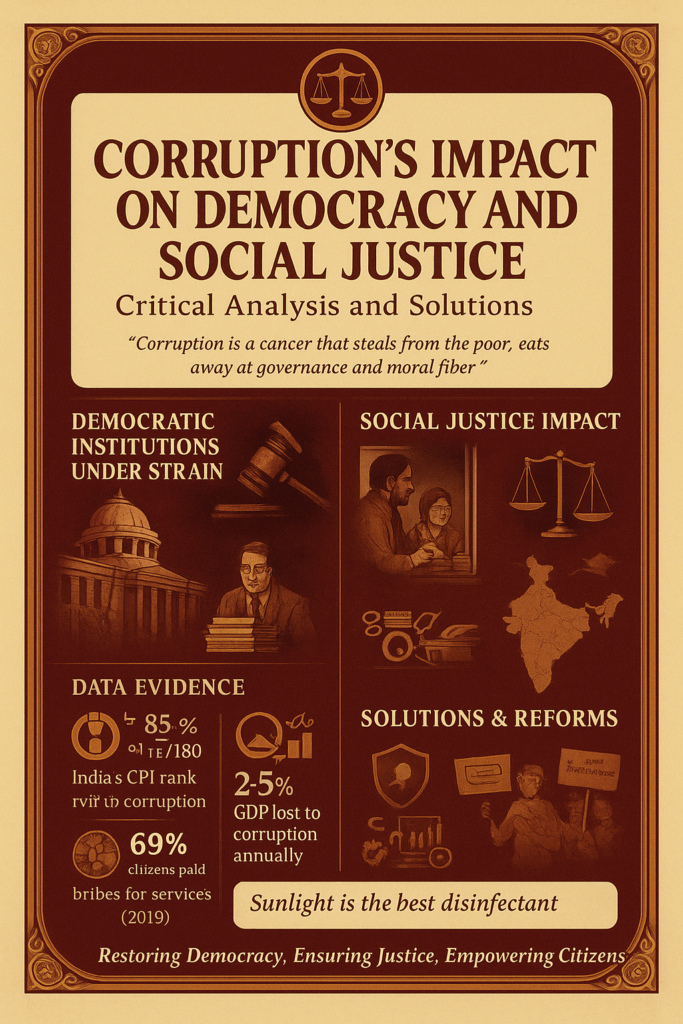
“Corruption is a cancer that steals from the poor, eats away at governance and moral fiber” – Joe Biden
I. Corruption’s Impact on Democratic Foundations
Institutional Degradation
- Electoral Process Erosion: Money power in elections undermining merit-based representation, constituency capture by corrupt politicians
- Legislative Dysfunction: Policy-making influenced by vested interests rather than public welfare, parliamentary procedures compromised
- Judicial Independence: Delays in corruption cases, selective prosecution undermining rule of law, public confidence erosion
- Administrative Paralysis: Bureaucratic delays, rent-seeking behavior, service delivery failures affecting governance efficiency
Democratic Values Destruction
- Transparency Deficit: Information asymmetry, RTI implementation challenges, opacity in government functioning
- Accountability Breakdown: Weak grievance redressal, impunity for corrupt officials, citizen trust decline
- Participatory Democracy: Public disengagement, cynicism toward democratic processes, reduced civic participation
II. Social Justice and Equality Impact
Economic Inequality Perpetuation
- Resource Misallocation: Development funds diversion, infrastructure quality compromise, targeted scheme leakages
- Poverty Trap: Poor paying bribes for basic services, education and healthcare access barriers
- Employment Discrimination: Merit bypassed for monetary considerations, competent candidates excluded
- Regional Disparities: Corrupt practices concentrating benefits in politically connected areas
Data Evidence
- India’s Corruption Perception Index: Ranking 85/180 (2023), below regional average affecting investment climate
- Economic Cost: Transparency International estimates 2-5% GDP loss annually due to corruption
- Service Delivery: 69% Indians paid bribes for public services (2019 survey), disproportionately affecting vulnerable sections
“The accomplice to the crime of corruption is frequently our own indifference” – Bess Myerson
III. Comprehensive Anti-Corruption Strategy
Legal and Institutional Reforms
- Prevention of Corruption Act: Enhanced punishment provisions, asset forfeiture, corporate liability inclusion
- Lokpal Institution: Central and state levels, independent investigation powers, time-bound disposal
- Whistleblower Protection: Anonymous complaint mechanisms, identity protection, reward systems
- Fast-Track Courts: Dedicated corruption courts, expedited trials, deterrent sentencing
Technology-Enabled Transparency
- Digital Governance: e-procurement systems reducing human interface, automated processes, blockchain applications
- Open Data Initiatives: Budget transparency, scheme monitoring, public access to government information
- Grievance Portals: Real-time complaint tracking, citizen feedback integration, performance monitoring
Civil Society and Media Role
- Social Audits: Community participation in scheme monitoring, transparency committees, public hearings
- Investigative Journalism: Exposing corruption cases, policy analysis, accountability journalism
- Awareness Campaigns: Integrity education, ethical training programs, value-based governance promotion
Systemic Interventions
- Administrative Reforms: Service delivery time limits, single-window clearances, performance-based incentives
- Political Finance Reform: Electoral funding transparency, expenditure limits, donation regulations
- International Cooperation: Asset recovery mechanisms, mutual legal assistance, global anti-corruption standards
“Sunlight is the best disinfectant” – Louis Brandeis
Conclusion
Corruption indeed undermines democracy by eroding institutional integrity, perpetuating inequality, and weakening public trust. India’s experience shows 2-5% GDP loss annually, with 69% citizens paying bribes, disproportionately affecting the poor. Effective combat requires comprehensive approach combining strengthened legal frameworks, technology-enabled transparency, active civil society participation, and systemic administrative reforms. Success demands sustained political will, citizen engagement, and institutional independence to restore democratic values and ensure equitable development.
